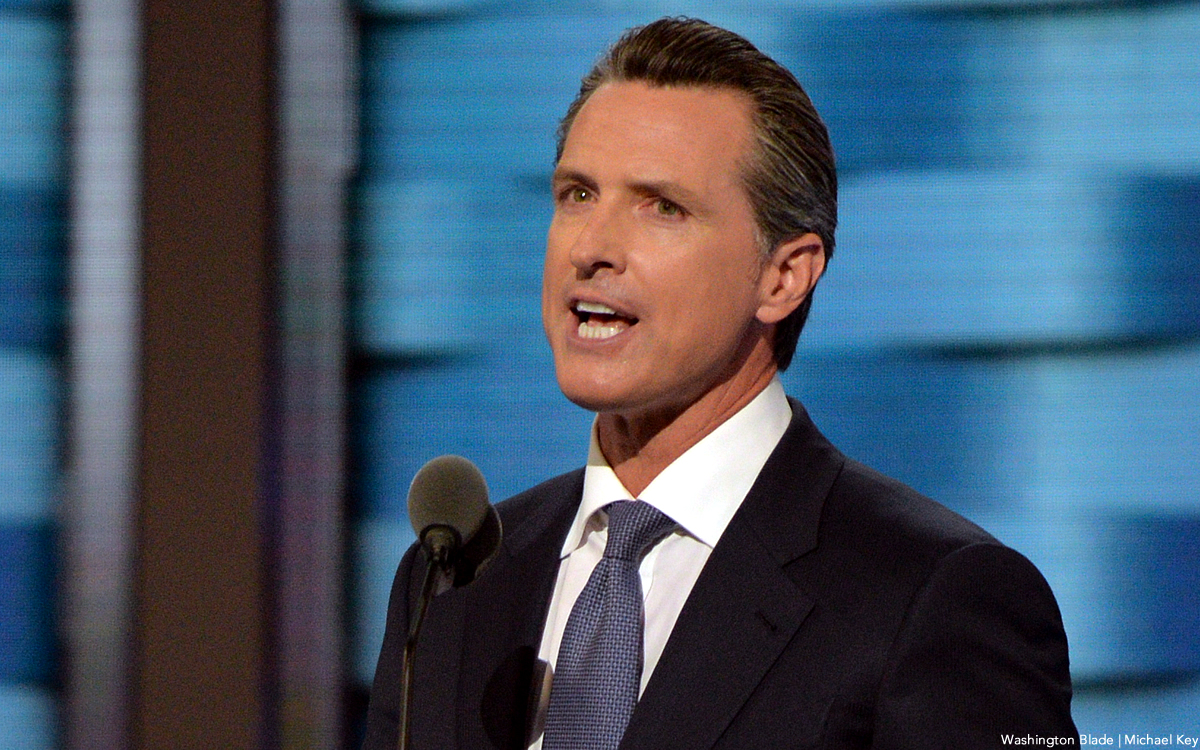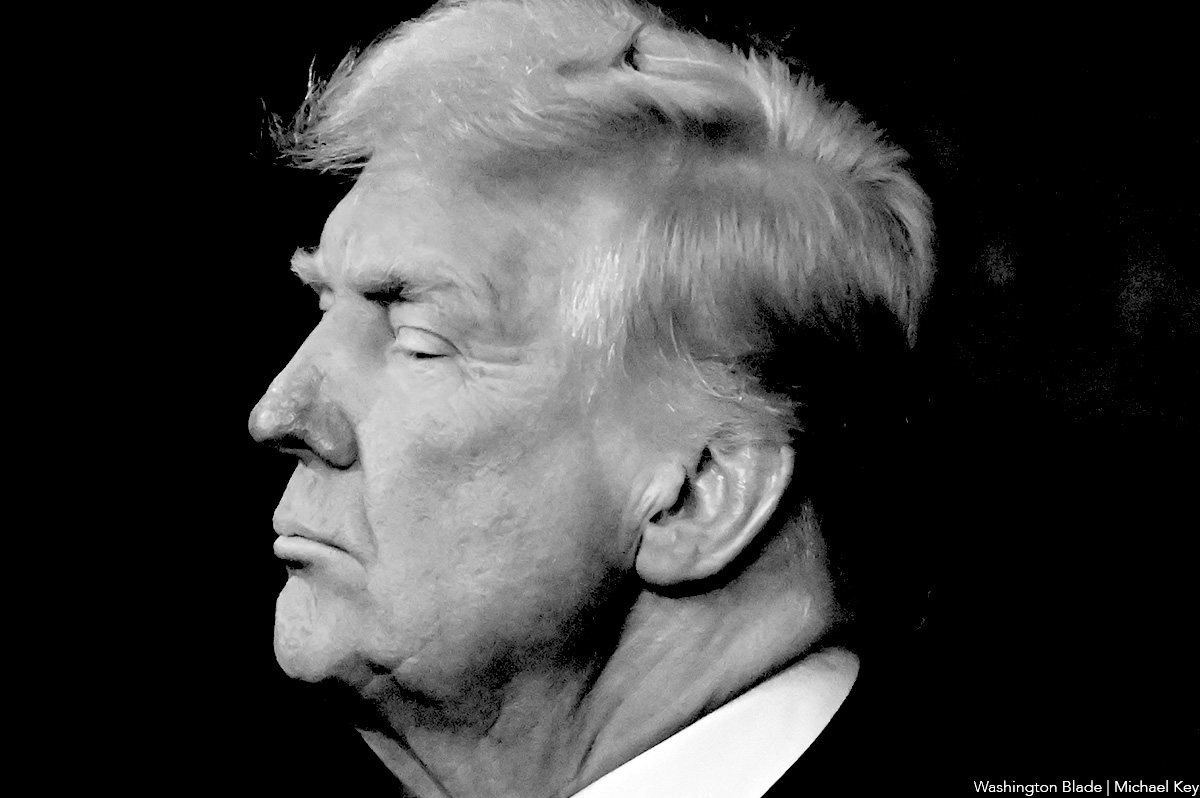Federal Government
Anti-LGBTQ conservatives target Department of the Interior spokesperson
White House, HRC condemned the attacks

A group of anti-LGBTQ right-wing pundits led by Libs of TikTok creator Chaya Raichik have led an online harassment campaign against out queer Tyler Cherry, principal deputy communications director and senior spokesperson for the U.S. Department of the Interior.
The attacks began on Thursday afternoon, when Raichik shared a post on X featuring a photo of Cherry — which looks like an official headshot — writing, “This is the Communications Director for the Secretary of Interior.”
Conservative news outlet The Blaze followed suit with a nearly identical post.
Hours later, Libs of TikTok shared more photos of Cherry in a post proclaiming, “Meet Tyler Cherry. The queer spokesperson for the @Interior.” The group also highlighted some of their past social media posts and previous employment with a progressive nonprofit.
Meet Tyler Cherry. The queer spokesperson for the @Interior.
— Libs of TikTok (@libsoftiktok) October 5, 2023
Tyler has a very interesting X history including propagating the Russia hoax, saying healthcare is racist and transphobic, suggesting Trump won cuz of white supremacy, promoting pronouns, and basically calling everyone… pic.twitter.com/Z1n61jx6w7
Raychik has come under fire for promulgating, by proxy, bomb threats against schools and educators that came after they were targeted by her on the Libs of TikTok social media accounts.
Cherry, who held high profile roles for major Democratic consulting firm SKDK and also within the Biden-Harris administration prior to his appointment at Interior, was honored among the Forbes “30 Under 30” list for media professionals.
Cherry did not respond to a request for comment. The FBI, which investigates and prosecutes threats against government officials, also did not immediately return a request for comment.
Human Rights Campaign National Press Secretary Brandon Wolf condemned the harassment of Cherry in a statement to the Washington Blade:
“Last week, Congresswoman Lauren Boebert hurled a transphobic tirade at U.S. Asst. Secretary of Defense for Readiness Shawn Skelly; this week, it’s Libs Of TikTok creator Chaya Raichik targeting Dept. of Interior Spokesperson Tyler Cherry. Simply for being who they are.”
Wolf continued, “This vile harassment is more of the extremist agenda to demonize the LGBTQ+ community and divide the country — and it’s exactly the kind of hateful rhetoric that has led to spiking violence and discrimination against LGBTQ+ people, mounting threats of violence against schools and children’s hospitals, and plunged the community into a state of emergency.”
He added, “Shame on those who peddle hate for clicks and cheap political points. We are grateful for the work of these talented public servants and the inspiration they bring to so many.”
GLAAD President Sarah Kate Ellis shared a statement with the Blade, writing “Again and again, extremists reveal just how desperate and unhinged they are about the mere existence of LGBTQ people, and it’s getting more dangerous and outrageous.”
“Recent posts have appeared to lead to bomb threats at elementary schools, libraries and children’s hospitals,” Ellis noted. “This must stop. Dehumanizing words and targeting of people just for who they are must stop.”
She added, “It’s also pointless- LGBTQ people are not going anywhere. We are in your families, workplaces, schools and government, welcome as we are. Social media bullies need to find something better to do. LGBTQ people will always be out here living with joy and freedom.”
In a statement to the Advocate on Friday, a White House spokesperson said “No one should be targeted simply for being themselves. It is cruel and unacceptable. This is an administration that believes to our core in the principle that out of many we are one — and we are proud that the people who serve in it reflect those values as well.”
The statement continued, “Tyler is an invaluable member of our team who continues to deliver for the Department of Interior and the American people.”
Federal Government
UPenn erases Lia Thomas’s records as part of settlement with White House
University agreed to ban trans women from women’s sports teams

In a settlement with the Trump-Vance administration announced on Tuesday, the University of Pennsylvania will ban transgender athletes from competing and erase swimming records set by transgender former student Lia Thomas.
The U.S. Department of Education’s Office for Civil Rights found the university in violation of Title IX, the federal rights law barring sex based discrimination in educational institutions, by “permitting males to compete in women’s intercollegiate athletics and to occupy women-only intimate facilities.”
The statement issued by University of Pennsylvania President J. Larry Jameson highlighted how the law’s interpretation was changed substantially under President Donald Trump’s second term.
“The Department of Education OCR investigated the participation of one transgender athlete on the women’s swimming team three years ago, during the 2021-2022 swim season,” he wrote. “At that time, Penn was in compliance with NCAA eligibility rules and Title IX as then interpreted.”
Jameson continued, “Penn has always followed — and continues to follow — Title IX and the applicable policy of the NCAA regarding transgender athletes. NCAA eligibility rules changed in February 2025 with Executive Orders 14168 and 14201 and Penn will continue to adhere to these new rules.”
Writing that “we acknowledge that some student-athletes were disadvantaged by these rules” in place while Thomas was allowed to compete, the university president added, “We recognize this and will apologize to those who experienced a competitive disadvantage or experienced anxiety because of the policies in effect at the time.”
“Today’s resolution agreement with UPenn is yet another example of the Trump effect in action,” Education Secretary Linda McMahon said in a statement. “Thanks to the leadership of President Trump, UPenn has agreed both to apologize for its past Title IX violations and to ensure that women’s sports are protected at the university for future generations of female athletes.”
Under former President Joe Biden, the department’s Office of Civil Rights sought to protect against anti-LGBTQ discrimination in education, bringing investigations and enforcement actions in cases where school officials might, for example, require trans students to use restrooms and facilities consistent with their birth sex or fail to respond to peer harassment over their gender identity.
Much of the legal reasoning behind the Biden-Harris administration’s positions extended from the 2020 U.S. Supreme Court case Bostock v. Clayton County, which found that sex-based discrimination includes that which is based on sexual orientation or gender identity under Title VII rules covering employment practices.
The Trump-Vance administration last week put the state of California on notice that its trans athlete policies were, or once were, in violation of Title IX, which comes amid the ongoing battle with Maine over the same issue.
Federal Government
White House finds Calif. violated Title IX by allowing trans athletes in school sports
Education Department threatens ‘imminent enforcement action’

The Trump-Vance administration announced on Wednesday that California’s Interscholastic Federation and Department of Education violated federal Title IX rules for allowing transgender girls to compete in school sports.
In a press release, the U.S. Department of Education’s Office of Civil Rights threatened “imminent enforcement action” including “referral to the U.S. Department of Justice” and the withholding of federal education funding for the state if the parties do not “agree to change these unlawful practices within 10 days.”
The agency specified that to come into compliance; California must enforce a ban excluding transgender student athletes and reclaim any titles, records, and awards they had won.
Federal investigations of the California Interscholastic Federation and the state’s Department of Education were begun in February and April, respectively. The Justice Department sued Maine in April for allowing trans athletes to compete and refusing a similar proposal to certify compliance within 10 days.
Broadly, the Trump-Vance administration’s position is that girls who are made to compete against trans opponents or alongside trans teammates are unfairly disadvantaged, robbed of opportunities like athletics scholarships, and faced with increased risk of injury — constituting actionable claims of unlawful sex discrimination under Title IX.
This marks a major departure from how the previous administration enforced the law. For example, the Department of Education issued new Title IX guidelines in April 2024 that instructed schools and educational institutions covered by the statute to not enforce categorical bans against trans athletes, instead allowing for limited restrictions on eligibility if necessary to ensure fairness or safety at the high school or college level.
Sports aside, under former President Joe Biden the department’s Office of Civil Rights sought to protect against anti-LGBTQ discrimination in education, bringing investigations and enforcement actions in cases where school officials might, for example, require trans students to use restrooms and facilities consistent with their birth sex or fail to respond to peer harassment over their gender identity.
Much of the legal reasoning behind the Biden-Harris administration’s positions extended from the 2020 U.S. Supreme Court case Bostock v. Clayton County, which found that sex-based discrimination includes that which is based on sexual orientation or gender identity under Title VII rules covering employment practices.
A number of high profile Democrats, including California Gov. Gavin Newsom, have recently questioned or challenged the party’s position on transgender athletes, as noted in a statement by Education Secretary Linda McMahon included in Wednesday’s announcement.
“Although Gov. Gavin Newsom admitted months ago it was ‘deeply unfair’ to allow men to compete in women’s sports, both the California Department of Education and the California Interscholastic Federation continued as recently as a few weeks ago to allow men to steal female athletes’ well-deserved accolades and to subject them to the indignity of unfair and unsafe competitions.”
Federal Government
Trump’s dismantling of US foreign aid derails HIV prevention effort in Africa
FDA approved breakthrough preventative drug lenacapavir earlier this month

On June 18, the Food and Drug Administration approved a long-acting injectable for the prevention of HIV that could have a transformational impact on decades-long efforts to end the epidemic in the U.S. and abroad.
Offering robust protection with just two doses per year, lenacapavir has the potential to dramatically improve uptake and adherence compared to daily oral PrEP regimens like Truvada or Descovy, particularly for high risk populations living in places with poor health infrastructure or where stigma about HIV discourages frequent testing and clinic visits.
According to the New York Times, however, the rollout of lenacapavir for HIV prevention overseas has been stymied by the gutting of agencies, staff, programs, and funding dedicated to foreign aid and public health during President Donald Trump’s second term.
Among other moves, the administration has frozen or withdrawn nearly all U.S. foreign development assistance, dismantled the U.S. Agency for International Development and reduced the size of its workforce by more than 95 percent, and shuttered key public health units housed under the U.S. Department of Health and Human Services, the National Institutes of Health, the Centers for Disease Control and Prevention, and the FDA.
As a result, the Times reports, HIV programs across the African continent have been “scrambling to procure drugs that the United States once supplied, replace lost nurses and lab technicians, and restart shuttered programs to prevent new infections.”
Experts fear HIV infection rates are climbing in some of the hardest-hit countries, but since the U.S. pulled funding for data collection and monitoring, there is no way to know for sure.
Historically, the U.S. has provided about 75 percent of all global spending on efforts to fight the epidemic, a reflection of the extent to which there was broad bipartisan support for the allocation of resources for this purpose through programs like the President’s Emergency Plan for AIDS Relief. Trump continued this legacy in his first term, launching the ambitious Ending the HIV Epidemic initiative that was continued under former President Joe Biden.
After returning to the White House, however, the president and his administration have justified their slash-and-burn cuts to the federal government’s work in international development and public health by arguing that funds and resources sent to overseas nations are too often pilfered by corrupt foreign state actors or wasted on ineffectual programs.
Trump and his allies also believe the U.S. should no longer be expected to shoulder such a disproportionate share of the responsibility for foreign aid, and that other countries are likelier to step up and contribute more in response to America’s retreat.
-

 U.S. Supreme Court4 days ago
U.S. Supreme Court4 days agoSupreme Court to consider bans on trans athletes in school sports
-

 Out & About4 days ago
Out & About4 days agoCelebrate the Fourth of July the gay way!
-

 Virginia4 days ago
Virginia4 days agoVa. court allows conversion therapy despite law banning it
-

 Opinions4 days ago
Opinions4 days agoCan we still celebrate Fourth of July this year?








